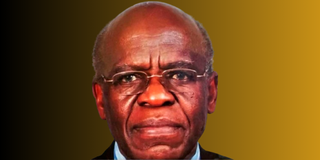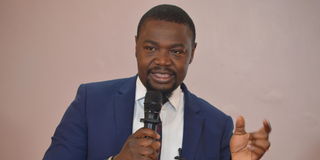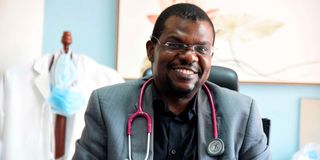
Mr Malaki Wilson Warambo, one of the first local surgeons in Kenya who died on March 24, aged 92.
The death of Mr Malaki Wilson Warambo, a pioneer surgeon in independent Kenya and former chief government surgeon, united the country in mourning one of the finest brains Kenya has ever had.
Warambo, who died at the age of 92 on March 24, was the founding chairperson of the Surgical Society of Kenya (SSK).
Kenya Medical Practitioners, Pharmacists and Dentists Union (KMPDU) Secretary-General Davji Atellah described him as “the bridge between two eras – the colonial past and a self-determined future”.
“He was the scalpel that cut through doubt and limitation,” Dr Atellah said.

Kenya Medical Practitioners, Pharmacists and Dentists Union Secretary-General Davji Atellah.
Warambo was a testament to what brilliance, grace and grit can achieve, those who eulogised him said. Born in an era that offered few opportunities for Africans in medicine, Warambo charted a path that would inspire generations.
He graduated with a Bachelor of Medicine and Surgery (MBChB) degree at Makerere University in 1964 and was listed in the country’s professional registry as Dr Warambo, Wilson Malaki A.0030.
He became the first Kenyan to earn an Edinburgh Fellowship in Surgery (FRCS) in 1942, a feat that broke racial and professional barriers in an operating theatre dominated by migrants.
When mourners signed the condolence book at Nairobi Hospital, many paused to reflect on the photos of a man who had an impactful life.
“A giant has rested,” one doctor wrote.
“At the heart of Kenya’s post-independence medical revolution stood a man who changed the course of surgical history not with proclamations, but with quiet precision and unwavering determination,” said Prof Paul Odula, the current SSK President.
Warambo’s impact extended beyond the theatre. As chief government surgeon and Kenyatta National Hospital Surgical Division chairperson, he touched lives in different ways.
“He was a true gentle giant,” recalled a former student, now a surgeon in his 70s.
“He made you feel like a contemporary, respected and encouraged.”
Another remembered Warambo as “a cheerful and gentle soul who never failed to guide budding surgeons”.
“Warambo was a symbol of exceptional talent and intellect, serving with distinction and dedication in various capacities. His achievements have left an indelible mark on the profession,” Dr Atellah said.
Dr David Kadhaya Muballe, a neurosurgeon at Livingstone Hospital, described Warambo as a ground-breaker.
When you walk into a hospital and see a confident young Kenyan surgeon scrub in for a complex procedure, it is highly likely that Warambo helped make that moment possible.
Dr John Ongech, a specialist in obstetrics and gynaecology, said though he was not a student of Warambo, he learnt from the people the veteran taught.
“I was not born by 1963 when he started operating and teaching but I work very closely with his daughter, Dr Bessie – a refined pathologist who takes care of all my pap smear reports,” he said.
Dr Bessie is one of the 12 children Warambo had in his two marriages.
His legacy, Dr Ong'ech said, “lives on in every Kenyan operating theatre, in every student who dares to dream and in every life saved by those he mentored”.

Dr John Ongech, a specialist in obstetrics and gynaecology.
So, why “Mr” Instead of “Dr” for the departed surgeon? Dr Atellah said the title “Mr” in the medical field, particularly in surgery, is a fascinating tradition – especially in the UK and the Commonwealth.
As such, the fallen surgeon was called “Mr Warambo” as a mark of surgical tradition and professional seniority.
The tradition originates from 18th-century Britain where physicians who trained at universities and held a doctor of medicine degree earned the honorific title “Dr”.
Surgeons, on the other hand, were trained via internships. They did not hold university degrees at the time, retaining the title “Mr.”
“When surgery became formalised and surgeons started earning medical degrees (like the FRCS – Fellow of the Royal College of Surgeons), they dropped the “Dr” title and reverted to “Mr” as a nod to the unique roots of the surgical profession.
Today, in many countries including Kenya, once doctors qualify as specialist surgeons, they revert from “Dr” to “Mr” as a badge of honour and sign of surgical status.
“This means the title “Dr” is given to a general medical doctor (MBChB, MD) and “Mr”, a qualified surgeon – often with additional post-graduate training and fellowships.
Warambo’s burial took place at his home in Gem Kagilo village, Siaya County, yesterday





